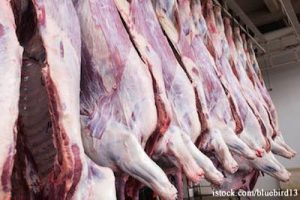Food & Water Watch released USDA inspection records this week from foreign meat plants that reveal problems of how deregulated meat inspection regimes can put US consumers at risk. The organization filed a Freedom of Information Act with the USDA’s Food Safety and Inspection Service (FSIS) for foreign establishment audit checklists for all audits the agency conducted between 2009 and 2012. The Obama Administration ended the practice of posting individual plant checklists on its website.
 There were 155 pages in the release, which covered audit checklists from eight countries. Three examples, from Australia and Canada, reveal “conflicts of interest and long histories of poor food safety performance.” Wenonah Hauter, executive director of Food & Water Watch, said in a statement, “These particular establishment audit reports should give U.S. consumers pause about the inadequacy of meat and poultry inspection systems responsible for the safety of products destined for the U.S. market. These records offer further proof that the Obama Administration must stop its efforts to deregulate meat and poultry inspection here in the United States and stop its recognition of privatized inspection schemes abroad. Plus, it is unacceptable that these records had to be obtained through the Freedom of Information Act when they should have been posted to the agency’s website in a timely manner.”
There were 155 pages in the release, which covered audit checklists from eight countries. Three examples, from Australia and Canada, reveal “conflicts of interest and long histories of poor food safety performance.” Wenonah Hauter, executive director of Food & Water Watch, said in a statement, “These particular establishment audit reports should give U.S. consumers pause about the inadequacy of meat and poultry inspection systems responsible for the safety of products destined for the U.S. market. These records offer further proof that the Obama Administration must stop its efforts to deregulate meat and poultry inspection here in the United States and stop its recognition of privatized inspection schemes abroad. Plus, it is unacceptable that these records had to be obtained through the Freedom of Information Act when they should have been posted to the agency’s website in a timely manner.”
The three establishments with problems include the following. Nolan Meats in Australia is a slaughter facility. It was part of a trial to pilot a new inspection model in which Australian government meat inspectors were replaced by company employees. FSIS formally recognized this privatized model as “equivalent” to U.S. meat inspection systems on March 3, 2011. But later that month, FSIS reported that employees of that establishment received financial benefits tied to profits generated by the facility, which is a conflict of interest. And the number of imported meat rejections from Australia has “increased dramatically” in recent months.
XL Foodsd in Canada is another of the problematic facilities. Last year beef from that plant was involved in the largest beef recall in Canadian history. Eighteen Canadians were sickened in an E. coli 0157:H7 outbreak linked to the beef produced at the XL plant. Issues found in a 2009 audit, including poor plant sanitation, record keeping, and inadequate oversight, were also present during the 2012 outbreak.
Maple Leaf Consumer Foods is the third facility with problems. It is part of the Beyond the Border Initiative that will deregulate border inspection by allowing Canadian meat products to bypass inspection by FSIS officials at the US border. In 2009, FSIS visited the plant and found poor record keeping, flaking paint over food contact areas, poor sanitation, deficient enforcement of food safety standards, and insufficient training of CFIA inspection personnel. Ms. Hauter concludes, “The Obama Administration should abandon its ill-conceived initiative for meat inspection because it will leave U.S. consumers vulnerable to unsafe meat products from Canada.”




